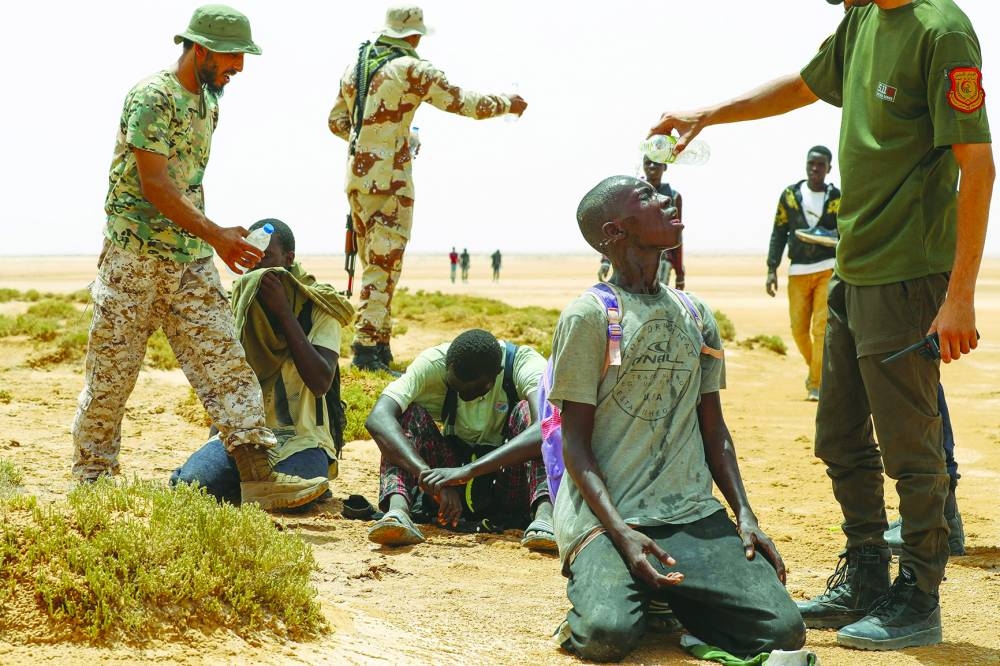In the unbearable midday heat, a Libyan patrol near the border with Tunisia comes across a black African man collapsed on the reddish-brown desert sand.
He is barely breathing, and officers try to revive him, gently, with a few drops of water on his lips.
The man is just one among hundreds of migrants arriving daily in Libya after being abandoned in the desert borderland by Tunisian security forces, according to Libyan border guards and the migrants themselves. By the time they reach Libya, the migrants from sub-Saharan Africa are ready to drop from exhaustion, in temperatures that have exceeded 40 degrees Celsius (104 degrees Fahrenheit). AFP on Sunday witnessed the border guards rescue around 100 men and women from an uninhabited zone near Sebkhat al-Magta, a salt lake along the Libya-Tunisia border.
In the distant shimmering heat haze, six figures emerge, the latest to reach the area. They speak Arabic and say they have come from Tunisia.
Libyan border guards said that, over the past two weeks, they have rescued hundreds of migrants who said they were left by Tunisian authorities in the border region near Al-Assah, about 150 kilometres west of Tripoli.
In early July, hundreds of migrants from sub-Saharan African countries were driven out of the Tunisian port city of Sfax as racial tensions flared following the death of a Tunisian man in a clash between locals and migrants.
Haitham Yahiya, from Sudan, said he worked for a year in Tunisia’s construction sector after reaching the country clandestinely through Niger and Algeria.
“I was at work when they caught me and brought me here, first in a police car then in a (security forces) truck. Then they left me and told me to go to Libya,” he said in Al-Assah.
At its closest point, near Sfax, Tunisia is only about 130 kilometres from the Italian island of Lampedusa. The North African country is a major gateway for migrants and asylum-seekers attempting perilous sea voyages in hopes of a better life in Europe, whose leaders have offered financial aid to help Tunisia manage the flow. Human Rights Watch said up to 1,200 black Africans were “expelled, or forcibly transferred by Tunisian security forces” in July to the country’s desert border regions with Libya and Algeria. In mid-July, the Tunisian Red Crescent said it had provided shelter to at least 630 migrants who had been taken after July 3 to Ras Jedir, about 40 kilometres north of Al-Assah.
A few days later, though, AFP gathered testimony from hundreds of migrants still stuck in the Ras Jedir buffer zone. They said they had been forced there by Tunisian security forces.
In Ras Jedir, 350 people remained in a makeshift camp, including 65 children and 12 pregnant women.
“Their living conditions are very problematic,” a humanitarian official said, adding that “it is not sustainable in the long term, there are no toilets, no water tanks, no real shelters”.
At Al-Assah, dazed migrants continue to stagger in, some with only sandals on their feet. In twos and threes or by the dozens, they come. Some collapse. The guards hold bottles of water over their parched mouths.
Faced with the influx, Libyans from the border guards Battalion 19 of the army, and a unit against Saharan immigration, have been patrolling daily.
“We are on the demarcation line between Libya and Tunisia and we see more and more migrants arriving every day,” said Ali Wali, Battalion 19 spokesman.

Libyan border guard provide water to migrants of African origin, following their arrival in an uninhabited area near Al-Assah on the Libya-Tunisia border on Sunday.
